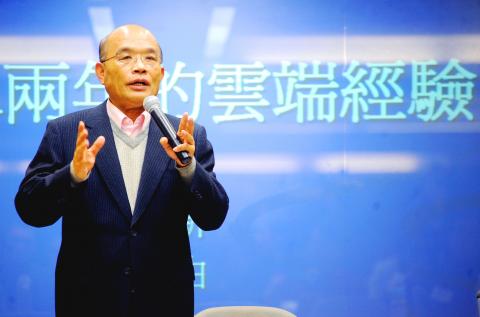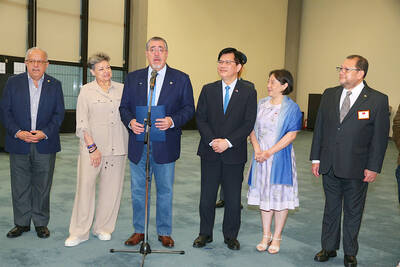Former premier Su Tseng-chang (蘇貞昌) on Tuesday proposed what he called new ideas on a “Taiwan Consensus” as a mechanism for conducting cross-strait talks, capping off a series of similar announcements by other senior members of the pan-green camp.
In an interview with the -Chinese-language Liberty Times (the Taipei Times’ sister newspaper), Su, the object of speculation over his possible bid for the presidency as a Democratic Progressive Party (DPP) candidate, said he wanted to base cross-strait relations on “the cornerstones of democracy,” which he said would better represent the interests of Taiwan.
Su told the paper his ideas were closely connected with the DPP’s 1999 Resolution on Taiwan’s Future, which defines Taiwan as a sovereign country separate from China, while acknowledging the Republic of China (ROC) as the country’s formal title.

Photo: Wang Min-wei, Taipei Times
“The ‘Taiwan consensus’ would better raise the bar in protecting Taiwan’s sovereignty,” he said, without providing specifics.
Su’s office confirmed the former premier would make an additional statement on the consensus this morning.
His comments come in the wake of similar calls by former premier Frank Hsieh (謝長廷) and former vice president Annette Lu (呂秀蓮) — both of the DPP — for a new cross-strait policy to replace the so-called “1992 Consensus” currently used by the government as the basis for bilateral ties.
Hsieh has proposed a “Constitutional Consensus” based on recognition of the ROC Constitution, while Lu has promoted what she termed the “1996 Consensus” — the year, she says, Taiwan became a de facto independent country following its first popular presidential election.
Party watchers said the three consensuses, which do not claim to replace the Resolution on Taiwan’s Future or any ratification by the party, likely represent attempts to appeal to more undecided voters by softening their stance on de jure independence.
Although Su and Hsieh have not ruled out making a bid for the party nomination ahead of next year’s presidential election, Su spokesman Xavier Chang (張敦涵) said the consensus and a possible shot at the presidency were unconnected.
Lu is also believed to be considering a bid.
DPP Chairperson Tsai Ing-wen (蔡英文), another likely contender for the DPP nomination, has pushed the party to work on a 10-year “master plan,” which would include detailed information on how to deal with future challenges arising from cross-strait relations.
The DPP, as well as former president Lee Teng-hui (李登輝), do not recognize the “1992 consensus,” which President Ma Ying-jeou’s (馬英九) administration and Beijing claim has buttressed the rapid development of cross-strait economic ties in the past two years, especially in the economic sphere.
The “1992 consensus,” which refers to “one China” with each side having its own interpretation of what this entails, was allegedly reached in 1992. However, then-KMT legislator Su Chi (蘇起) admitted in 2006 to coining the term in 2000, when he was Mainland Affairs Council chief, before the KMT handed over power to the DPP.
In related developments, Lu, still upset over a decision to base DPP primaries entirely on telephone polls, led several supporters to the DPP central party headquarters to invite Tsai and other senior party officials to a gathering against the changes on Sunday.
Party officials arranged for Lu to meet DPP Secretary-General Su Jia-chyuan (蘇嘉全), who told her that Tsai and himself would be out of town that day, adding that more junior officials would attend on their behalf.
Meanwhile, Hsieh said Tsai should declare her candidacy in the DPP primaries as her high poll figures gave her an advantage.
Once she has gotten this out of the way, “I’ll also give consideration to [a bid for the presidency],” he said.

Greenpeace yesterday said that it is to appeal a decision last month by the Taipei High Administrative Court to dismiss its 2021 lawsuit against the Ministry of Economic Affairs over “loose” regulations governing major corporate electricity consumers. The climate-related lawsuit — the first of its kind in Taiwan — sought to require the government to enforce higher green energy thresholds on major corporations to reduce emissions in light of climate change and an uptick in extreme weather. The suit, filed by Greenpeace East Asia, the Environmental Jurists Association and four individual plaintiffs, was dismissed on May 8 following four years of litigation. The

A former officer in China’s People’s Liberation Army (PLA) who witnessed the aftermath of the 1989 Tiananmen Square massacre has warned that Taiwan could face a similar fate if China attempts to unify the country by force. Li Xiaoming (李曉明), who was deployed to Beijing as a junior officer during the crackdown, said Taiwanese people should study the massacre carefully, because it offers a glimpse of what Beijing is willing to do to suppress dissent. “What happened in Tiananmen Square could happen in Taiwan too,” Li told CNA in a May 22 interview, ahead of the massacre’s 36th anniversary. “If Taiwanese students or

DIPLOMACY: It is Guatemalan President Bernardo Arevalo’s first visit to Taiwan since he took office last year, while Eswatini’s foreign minister is also paying a visit A delegation led by Guatemalan President Bernardo Arevalo arrived in Taiwan yesterday afternoon and is to visit President William Lai (賴清德) today. The delegation arrived at Taiwan Taoyuan International Airport at 4:55pm, and was greeted by Minister of Foreign Affairs Lin Chia-lung (林佳龍). It is Arevalo’s first trip to Taiwan since he took office last year, and following the visit, he is to travel to Japan to celebrate the 90th anniversary of diplomatic relations between the two countries. Arevalo said at the airport that he is very glad to make the visit to Taiwan, adding that he brings an important message of responsibility

About 3,000 people gathered at events in Taipei yesterday for an annual candlelight vigil commemorating the 1989 Tiananmen Square Massacre, a brutal crackdown by Chinese authorities on a student-led demonstration in Beijing on June 4 36 years ago. A candlelight vigil organized by the New School for Democracy and other human rights groups began at 7pm on Democracy Boulevard outside Chiang Kai-shek Memorial Hall, with the theme "Resist Transnational Repression, Defy Totalitarianism." At about 8pm, organizers announced that about 3,000 people had attended the event, which featured brief speeches by human rights advocates from Taiwan and China, including Hong Kong, as well